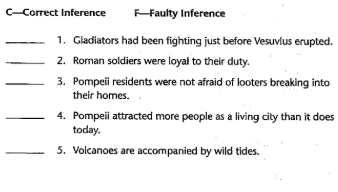Classify each statement as a correct inference or a faulty inference: 1. Gladiators had been fighting just before Vesuvius erupted. 2. Roman soldiers were loyal to their duty. 3. P... Classify each statement as a correct inference or a faulty inference: 1. Gladiators had been fighting just before Vesuvius erupted. 2. Roman soldiers were loyal to their duty. 3. Pompeii residents were not afraid of looters breaking into their homes. 4. Pompeii attracted more people as a living city than it does today. 5. Volcanoes are accompanied by wild tides.

Understand the Problem
The question presents a list of statements related to Pompeii and asks the user to classify each statement as a correct inference or a faulty inference. This involves analyzing historical context and comprehension of the events surrounding Pompeii and Vesuvius.
Answer
1. F, 2. C, 3. F, 4. C, 5. F
- Faulty Inference, 2. Correct Inference, 3. Faulty Inference, 4. Correct Inference, 5. Faulty Inference
Answer for screen readers
- Faulty Inference, 2. Correct Inference, 3. Faulty Inference, 4. Correct Inference, 5. Faulty Inference
More Information
Assessing based on historical context: gladiator events' timing is uncertain; Roman soldiers were generally loyal; evidence of fear of looters is lacking; Pompeii was densely populated; wild tides aren't specifically linked to volcanoes.
Tips
A common mistake is not considering historical records or evidence carefully.
AI-generated content may contain errors. Please verify critical information